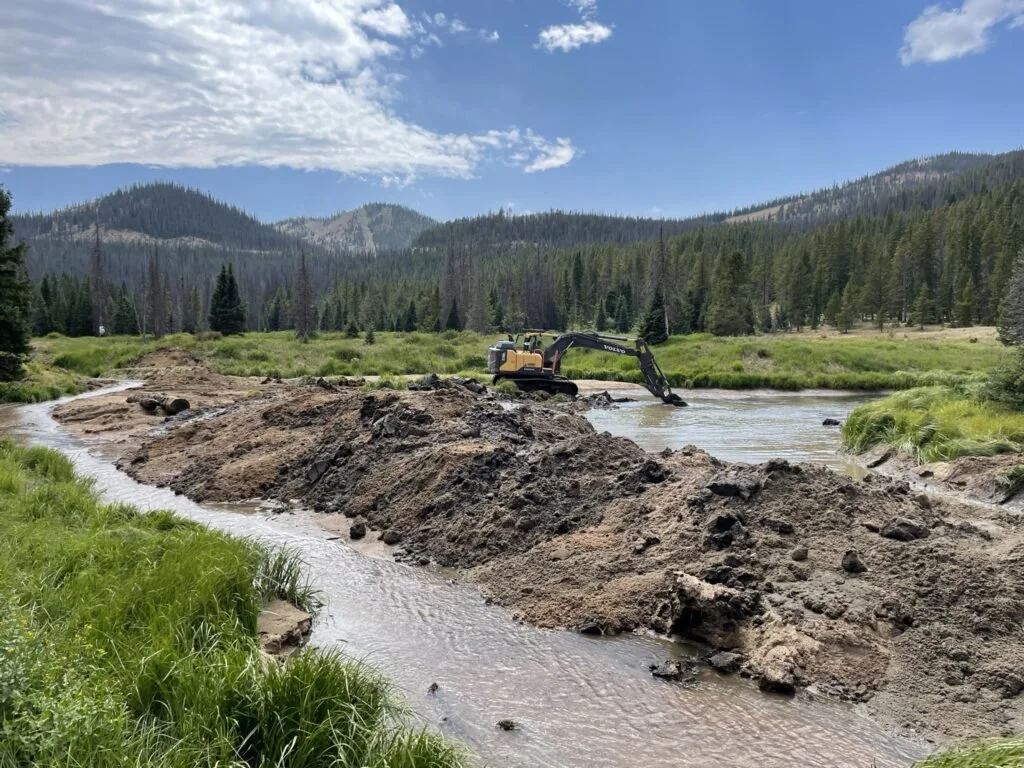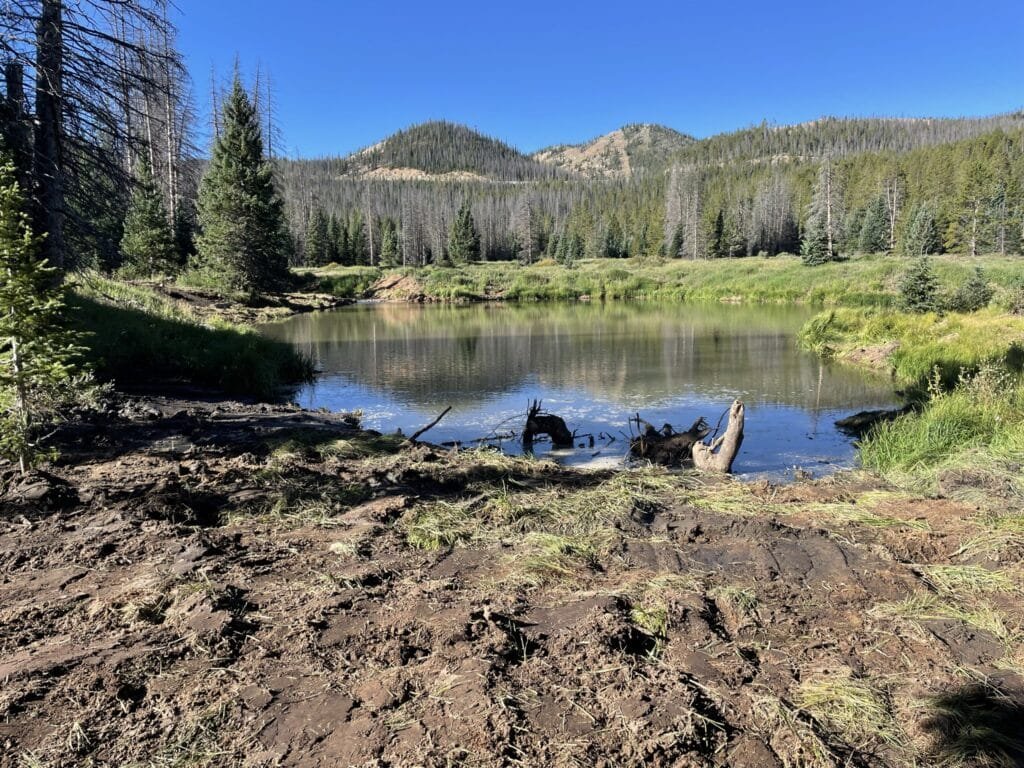By Nick Gann, Southwest Communications Director
Near the top of Monarch Pass, which rises to 11,312 feet, are the Monarch Park Ponds nestled among this picturesque landscape. During the summer of 2023, a restoration project quietly unfolded as a testament to the power of collaboration. This ambitious endeavor was not just about restoring lost fishing access, but also about rejuvenating an ecosystem that has faced challenges for 15 years.
Spearheaded by Trout Unlimited in partnership entities such as the U.S. Forest Service (USFS), Colorado Parks and Wildlife (CPW), Newmont’s Cripple Creek & Victor Gold Mine, Freeport McMoRan, Colorado Department of Transportation (CDOT), U.S. Lime and Minerals, and Collegiate Peaks Chapter of TU, this restoration project set new standards in environmental stewardship.
“For more than 15 years, the Monarch Park Ponds have faced increasing sediment accumulation stemming from the surrounding basin and highway,” said Jason Willis, TU’s western Abandoned Mine Lands (AML) program director. “The degradation of these ponds prompted a comprehensive restoration effort and desire to replace the expected loss of fishing access from the nearby South Fooses Dam removal that is scheduled to take place in 2024.”
In response to the substantial sediment accumulation that had filled several ponds due to the adverse impacts of highway sand and erosive decomposing soils, a series of initiatives were implemented to breathe new life into these ponds. Undertaking an exhaustive dredging effort, approximately 1,860 cubic yards of dredge material were meticulously transported to U.S. Lime and Minerals for stockpiling.
Next, nine trees with roots intact were used to plug the old pond outlet resulting in undercut habitat for fish. This structure also allowed for the construction of a new channel between two of the ponds to protect a nearby access road from future encroachment.
A degraded levee near the ponds also received an upgrade with TU bolstering the spillway with a mix of riprap (angular rock between 4 and 12 inches), 3 to 4-foot boulders, and native vegetation to maintain the desired water levels in the ponds. This also allowed excess water to enter the spillway in a controlled manner and continue to move downstream.
Additional measures, such as channel shaping, bank stabilization, erosion controls, and grade controls were also undertaken to improve habitat and allow for renewed fishing opportunities next year.
“The success of the Monarch Park Ponds Restoration project is indebted to the generous contributions and collaborative spirit of its diverse group of partners,” said Willis. “Our partners played pivotal roles in donating the time, equipment, and manpower to the project. Newmont Mining, Freeport McMoRan, and TU’s Keystone Agreement with the USFS also provided essential funding, infusing the project with the financial support required for its ambitious goals.”
As the landowner, the USFS was also instrumental in providing staff specialists to complete necessary environmental review processes, concurrence, and project oversight. The great communication by USFS throughout the project really allowed partners to collaborate on ideas and crucial field decisions.
In terms of time and resources, CDOT and CPW made significant contributions. CDOT, recognizing the importance of the project, contributed haul trucks and facilitated the transportation of dredge material to U.S. Lime and Minerals. CPW, on the other hand, demonstrated their commitment by donating personnel time, expert operator time, and crucial equipment such as an excavator and loader. Their contributions went beyond mere support, with both agencies actively participating in the restoration process and contributing to the project’s success.
As a key partner, U.S. Lime and Minerals also demonstrated unparalleled generosity by allowing project partners to surpass the initially planned dredging amount. This flexibility enabled the removal of additional accumulated material from the ponds, contributing significantly to the overall success of the restoration.
The TU Collegiate Peak Chapter will also become a driving force for the project’s future phases. Securing a grant for the installation of an ADA pier on one of the ponds, this chapter will play a crucial role in addressing the accessibility challenges that will occur from the removal of Fooses Dam next year.
In essence, the Monarch Park Ponds Restoration project stands as a shining example of what can be achieved through collaboration and environmental stewardship. This unique restoration initiative, fueled by federal infrastructure funding, not only restores lost fishing access but also ensures a sustainable future for the local community. With improved ADA access, enhanced habitats, and a commitment to ecological balance, Monarch Park Ponds is poised to become a haven for anglers as well as a thriving ecosystem for generations to come.







